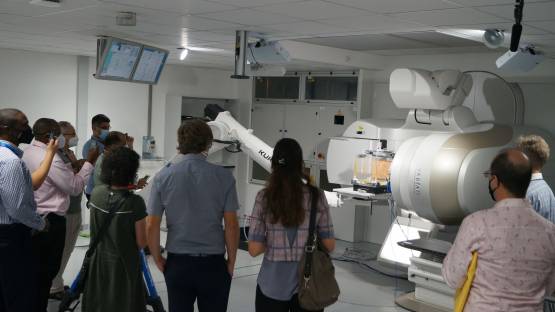To support hospitals in tackling the global cancer burden and to encourage them in taking part in independent audits, the IAEA recently organized a meeting for experts from national and international dosimetry audit networks (DANs). Participants from diverse disciplines, such as clinical radiotherapy medical physicists, dosimetry specialists and radiation metrologists from hospitals, clinical trial quality assurance groups, international and national dosimetry audit centres, and dosimetry laboratories, discussed the status and common challenges in the area of dosimetry audits in radiotherapy (RT).
The IAEA in collaboration with the World Health Organization provides postal dosimetry audit services to around 300 hospitals annually. According to the IAEA DIrectory of RAdiotherapy Centres (DIRAC), there are more than 7600 RT centres in the world, and a regular independent check of the dose output of all clinical radiation beams is considered good practice. Over the years, several national and international dosimetry audit networks have emerged that can provide these services to RT centres. Unfortunately, only a third of the world’s RT centres regularly participate in external audits, despite rapidly evolving radiotherapy infrastructure.
"For many years, Israeli Radiotherapy Centres have been benefiting from IAEA/WHO postal dosimetry audits that ensure the quality of basic dosimetry,” said Annette Wygoda, a meeting participant from the Radiation Control Unit of Ministry of Health of Israel.
Providing local comprehensive audits for advanced RT techniques implemented in all hospitals in a country is critical, but this involves a complex and demanding process. “With presentations from several countries and lively discussions, the meeting was a great opportunity to share our experiences and learn from other participants facing similar challenges,” Wygoda added.
In 2010, the IAEA started collecting and reviewing information on the availability of dosimetry audits worldwide and created a DAN database, aimed at raising awareness of the audits. This work complemented a series of coordinated research projects (CRPs) that had started in 1995 for developing and disseminating different auditing methodologies across national DANs. In addition, reference and blind irradiation services for DANs operating remote solid state dosimetry systems for audits was established to give them confidence in their local audit results. This service has been expanded in 2021 to include blind irradiations in the photon and electron beams of the IAEA linac.
The hybrid meeting, which attracted 56 experts from 36 countries, was organized to foster greater harmonization, cooperation, and collaboration among DANs. It provided a platform for all DANs to share their experiences and discuss key issues faced by the dosimetry auditing community. The key challenges identified included the need for technical guidelines, training material and harmonized reporting templates. As access to dosimetry audit services is important to the clinical radiotherapy medical physics community, assuring the quality and credibility of DANs through an international recognition scheme was an important recommendation of the meeting.
“We conduct dosimetry audits in Brazil and other Latin American and Caribbean countries for over 20 years,” said Claudio Viegas from the National Cancer Institute in Brazil. “We have participated in several IAEA coordinated research projects and regularly use the Agency service of reference and blind irradiations of our dosimeters. The DAN meeting contributed to future harmonization of auditing activities in the field of radiotherapy by bringing us together with other national and international auditing groups.”
The IAEA encourages radiotherapy centres to participate in national and international dosimetry audits to check the calibration of their clinical beams.




